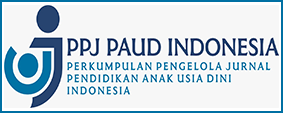
Author
Kartika Rinakit Adhe(1
Pendidikan Guru Pendidikan Anak Usia Dini, Universitas Negeri Surabaya, Indonesia(1)
Pendidikan Guru Pendidikan Anak Usia Dini, Universitas Negeri Surabaya, Indonesia(2)
Pendidikan Olahraga, Universitas Negeri Surabaya, Indonesia(3)
Pendidikan Guru Pendidikan Anak Usia Dini, Universitas Negeri Surabaya, Indonesia(4)
Pendidikan Guru Pendidikan Anak Usia Dini, Universitas Negeri Surabaya, Indonesia(5)
| Article Analytic |
Published : 2020-06-08
Article can trace at:
 Article Metrics
Article Metrics
Abstract Views: 3388 times
PDF Downloaded: 1148 times
Abstract
This study aims to determine the correlation between parental income levels with the role of parents. The sample is 370 parents of affected by Covid-19 pandemic in Indonesia. The method used is a quantitative correlational approach to the type of survey analysis. The results showed the frequency of parents playing with children before and during the pandemic increased from 38.6% to 62.0%. The results of the bivariate correlation analysis are significance values of 9,956 (Sig> 0.05) with Pearson correlation coefficient numbers showing a result of -0.003 which means that the correlation only 0.003. The correlation coefficient is negative then correlation is inversely proportional, if the income level is moderate then the role of parents is high and vice versa which means that Ha is rejected and Ho is accepted there is no correlation between the level of parental income with the role of parents in early childhood learning during Covid-19.
Keywords
References
Awan, Masood Sarwar and Malik, N. and S., & Haroon and Waqas, M. (2011). Impact of education on poverty reduction. Munich Personal RePEc Archive.
Breierova, L., & Duflo, E. (2004). The Impact of Education on Fertility and Child Mortality: Do Fathers Really Matter Less Than Mothers? https://doi.org/10.3386/w10513
Cesur, R., Dursun, B., & Mocan, N. (2014). The Impact of Education on Health and Health Behavior in a Middle-Income, Low-Education Country. https://doi.org/10.3386/w20764
Cohen, J., Cohen, P., West, S. G. W., & Aiken, L. S. (2003). Applied Multiple Regression/Correlation Analysis for the Behavioral Sciences. lawrence Erbaum Associate.
Fadillah, F. (2020). Early Childhood Metacognitive Learning among Students of Early Childhood Teacher Education. Jurnal Obsesi : Jurnal Pendidikan Anak Usia Dini, 4(2), 658664.
Fahmie, T. A., & Luczynski, K. C. (2018). Preschool life skills: Recent advancements and future directions. Journal of Applied Behavior Analysis, 51(1), 183188. https://doi.org/10.1002/jaba.434
Hewi, L., & Asnawati, L. (2020). Strategi Pendidik Anak Usia Dini Era Covid-19 dalam Menumbuhkan Kemampuan Berfikir Logis. Jurnal Obsesi : Jurnal Pendidikan Anak Usia Dini, 5(1), 158167. https://doi.org/10.31004/obsesi.v5i1.530
Hidayah, S. N., Yuniastuti, A., & Kuswardinah, A. (2019). Difference of Maternal Parenting Style on Childs Growth And Motoric Development. Public Health Perspective Journal, 0(0).
Hind, K., Larkin, R., & Dunn, A. K. (2019). Assessing Teacher Opinion on the Inclusion of Children with Social, Emotional and Behavioural Difficulties into Mainstream School Classes. International Journal of Disability, Development and Education, 66(4), 424437. https://doi.org/10.1080/1034912X.2018.1460462
Junge, S. K., Manglallan, S., & Raskauskas, J. (2003). Building life skills through afterschool participation in experiential and cooperative learning. Child Study Journal, 33(3), 165175.
Lo Cricchio, M. G., Lo Coco, A., Cheah, C. S. L., & Liga, F. (2019). The Good Parent: Southern Italian Mothers Conceptualization of Good Parenting and ParentChild Relationships. Journal of Family Issues, 40(12), 15831603. https://doi.org/10.1177/0192513X19842598
Maleki, M., Chehrzad, M. M., Kazemnezhad Leyli, E., Mardani, A., & Vaismoradi, M. (2019). Social Skills in Preschool Children from Teachers Perspectives. Children, 6(5), 64. https://doi.org/10.3390/children6050064
Mallick, L., Kumar, P., & Pradhan, K. C. P. (2016). Impact of educational expenditure on economic growth in major Asian countries: Evidence from econometric analysis. Theoretical and Applied Economics, XXIII(2), 173186.
Praherdhiono, H., & Eka Pramono Adi, Yulias Prihatmoko, Nunung Nindigraha, Yerry Soepriyanto, Henny Indreswari, H. I. O. (2020). Implementasi Pembelajaran di Era dan Pasca Pandemi Covid-19 - Henry Praherdhiono, Eka Pramono Adi, Yulias Prihatmoko, Nunung Nindigraha, Yerry Soepriyanto, Henny Indreswari, Herlina Ike Oktaviani - Google Books. CV. Seribu Bintang.
Toscano, C., Soares, I., & Mesman, J. (2020). Controlling Parenting Behaviors in Parents of Children Born Preterm. Journal of Developmental & Behavioral Pediatrics, 41(3), 230241. https://doi.org/10.1097/DBP.0000000000000762
van Nunen, K., Kaerts, N., Wyndaele, J.-J., Vermandel, A., & Hal, G. Van. (2015). Parents views on toilet training (TT). Journal of Child Health Care, 19(2), 265274. https://doi.org/10.1177/1367493513508232
Walliman, N. (2017). Research Methods: The Basics. Routledge. https://doi.org/10.4324/9781315529011
WHO. (2020). Coronavirus disease (COVID-19) outbreak. Emergencies - Diseases.
Wiseman, T., & Young, A. T. (2013). Economic Freedom, Entrepreneurship, & Income Levels: Some Us State-Level Empirics Economic Freedom, Entrepreneurship, & Income Levels: Some Us State-Level Empirics. American Journal of Entrepreneurship, VI(1), 104124.
Yadav, P. P. S., & Chandola, R. (2019). Authoritarian Parenting Style And Its Effect on Self-Esteem And Coping Strategies Of 21 Year Old GirL. Global Journal For Research Analysis, 8(3).
Refbacks
- There are currently no refbacks.

_2022_inPress.png)








